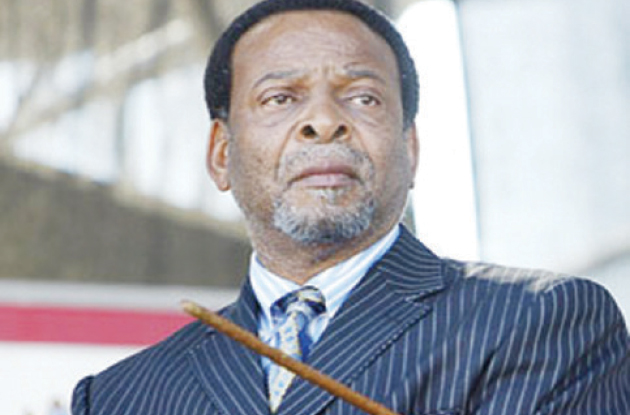South Africa’s woes stem from disparities in wealth distribution

Cuthbert Mavheko
ZULU King Goodwill Zwelithini’s “planned” visit to Zimbabwe at the end of the month has stirred a storm among Zimbabweans with some people calling on the government to declare him persona non grata and bar him from visiting the country due to his hostile stance against African migrant workers in South Africa.
Early this year, the Zulu monarch called on the removal of all African foreigners from the neighbouring country.
This ignited a conflagration of xenophobic violence that exposed hordes of African migrant workers from Zimbabwe, Mozambique, Zambia, Malawi and Nigeria to horrific acts of brutality at the hands of marauding groups of xenophobic South African hoodlums.
“Zwelithini is an evil man and the government should not permit him to visit Zimbabwe. He hates black foreigners in South Africa and is to blame for the xenophobic violence that erupted in that country not so long ago. I’m a victim of this violence, I sustained serious head injuries after being attacked by a mob in Durban,” said James Nkala of Gwabalanda suburb in Bulawayo.
The Zulu king and his sympathisers, who include President Jacob Zuma’s son Edward, should desist from making African migrant workers scapegoats for the economic ills that dog South Africa.
They should, instead, concentrate on identifying the real cause of the ills for purposes of finding a tangible solution. When one has a carbuncle, it is important to extricate the pus. What is, however, of greater significance is to establish what caused the infection in the first place.
Blaming African foreign migrants for the economic challenges faced by black South Africans is an act of naivety.
If anything, this “scape-goating” only fuels tension between locals and foreigners, culminating in xenophobic violence.
One does not need to be a political scientist to discern that the major cause of strife in South Africa is the skewed pattern in the distribution of resources such as land.
When white settlers invaded South Africa in 1652, they dispossessed the original inhabitants of that country, the African people, of their ancestral land.
Despite the fact that South Africa gained independence many years ago, indigenous South Africans — the Zulus, Xhosas, Venda and others are still a colonised people.
The vestiges of colonialism are still strong in South Africa in the same way that they are still strong in countries where white settlers robbed the indigenous inhabitants of their land.
It should be stated that the scourges of poverty, unemployment, landlessness and illiteracy that have reduced the generality of black South Africans to paupers in their own motherland emanate from the fact that the levers of South Africa’s economy are in the hands of the white settlers.
For more than 300 years, the Afrikaners and the British have occupied South Africa and today more than 70 percent of all arable land in that country is owned by them while indigenous blacks are packed like sardines on tiny pieces of patchy, unproductive land.
It is pertinent to mention that almost 85 percent of South Africa’s wealth is in the hands of white foreigners, whose population is a mere 4.6 million, while the 41 million black population controls only 15 percent of the economy.
What a shocking paradox! It is equally insightful to note that today a quarter of all black households in South Africa earn less than R300 a month and two thirds are languishing below the poverty datum line currently pegged at R900. On the other hand, over two thirds of white households in South Africa earn more than R2,000 a month.
That is the situation in South Africa today. All this accords credibility to assertions by some analysts that South Africa is the most unequal country in the world in terms of income disparities.
When South Africa’s first black President Nelson Mandela died in 2013, the international community eulogised him, describing him as an “international icon of legendary status.”
He was also portrayed as “the faultless father of the Rainbow Nation.” From the lenses of an ordinary observer, mere observation tells us that the international community, in particular Western nations, had every good reason to praise and deify Mandela. This is because during his tenure of office as President of the Republic of South Africa, he did not tamper with their illgotten property rights.
This obviously made him a darling of the mighty Western empire. Given the foregoing, it is easy to understand why Western imperialists denounce President Mugabe as a “dictator” and slapped Zimbabwe with a devastating economic embargo when he initiated land reform in Zimbabwe.
In the eyes of Western imperialists, President Mugabe set a bad example and deserved to be punished to stop other African leaders from following in his steps.
It certainly would be foolhardy to negate the role played by Mandela in dismantling the pillars of apartheid in South Africa. Be that as it may, the bitter truth that those who hero-worshipped him must confront is that Mandela betrayed his own black people, notwithstanding the fact that he had fought so valiantly for their freedom for many years.
When Mandela was released from prison in 1993 his fighting spirit had waned. Upon being inaugurated as the first black president of South Africa, he turned his back on the ideals of the struggle against apartheid and, in so doing, abandoned his own black people to the mercy of fate. The new constitution that Mandela crafted with the collaboration of white South Africans benefited the whites and a few blacks in the corridors of power. Indeed, it is a very sad state of affairs.
This constitution failed dismally to address the thorny issues of land ownership, poverty, illiteracy and unemployment that dog the black population in South Africa to this very day.
When we examine Mandela’s achievements within the context of his people’s struggle against apartheid, it is striking to note that they do not go beyond the attainment of political independence for blacks in South Africa. Political independence without economic independence is inconsequential.








Comments